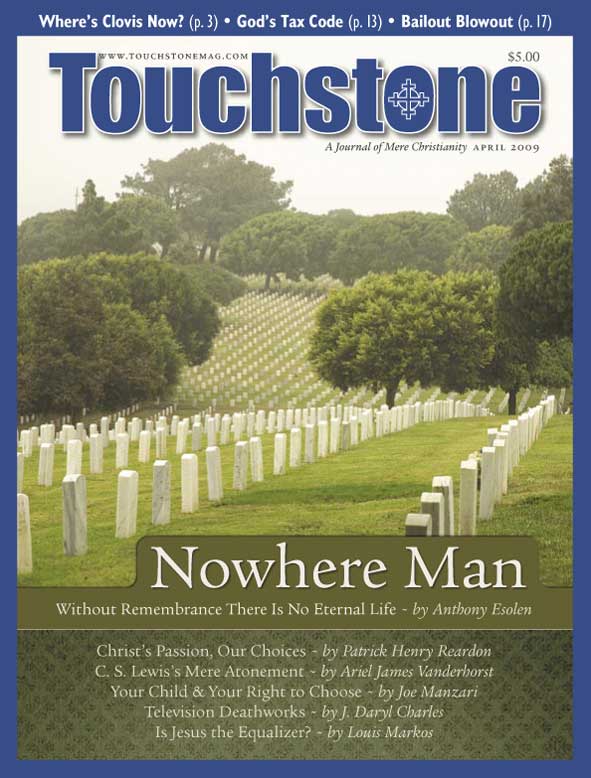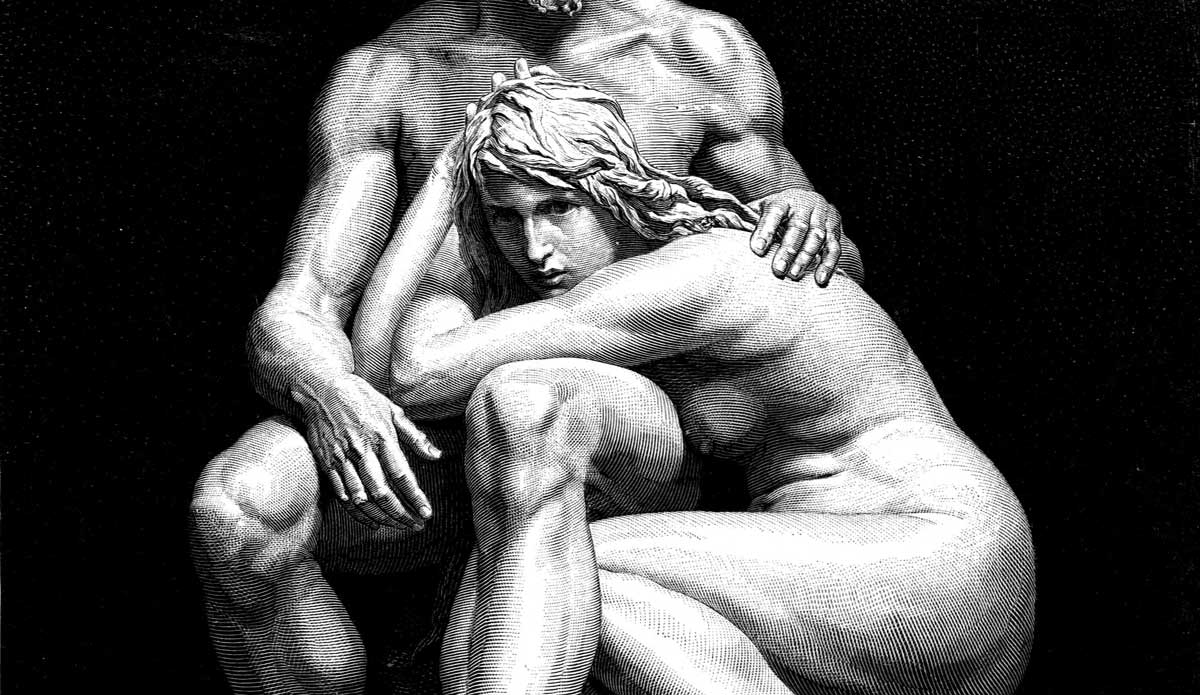Past Present
The Grateful Living Will Rise Up
And with a great groan Jesus gave up the ghost. Then his disciples fled.
When the barbarian warlord Clovis first heard the account of the Crucifixion, he is said to have shaken his head and said, “If only I had been there with my Franks!” “If only we had been there,” we say. Why? What would we have done?
The disciples fled because they were in danger of their lives. Yes, they were, and it soothes us to think so. It allows us to believe that a little more of a virtue we can understand, courage, would have kept them steadfast. So embarrassed was one old Saxon monk by their flight, that he gave them something noble to do first. The beloved thanes of the Lord, says the author of the stupendous Dream of the Rood, took their victorious chieftain down from the Cross, “a little weary after the great battle.” Dead, that is. Then they sang him a lay of sorrow. Only then did they leave him.
Stouthearted German warriors, those apostles in the poem. Yet I think they can tell us what the disciples were really running from, and what they have to say does no credit to modern man. For modern man is a runaway. Indeed, being a runaway is almost the only virtue he acknowledges, though he calls it by names that lay a flattering unction to his soul.
The Weight of Loss
With Jesus on the Cross died all the hopes the disciples had ever had. They were crushed under the unbearable weight of loss. To look upon the face of that dead man was to remember when he had touched the man with the withered hand, and it was healed. It was to recall the faint irony in the voice when he called his beloved John and James “the sons of thunder.” It was to feel once more the peace upon the hillside, a re-echoing stillness, as the simple words poured forth: “Blessed are the poor in spirit, for theirs is the kingdom of heaven.” To be with Jesus at such a time—was it not like being granted a fleeting moment of divine knowledge, so that you could look upon all creation and see that it was very good?
“It is good for us to be here!” cried Peter upon the mount of transfiguration. He was not in his senses at the time, says the evangelist by way of apology. No apology is needed. The vision vanished.
And now on the mount of Calvary, everything that Peter and his fellows had ever known of Jesus vanishes. The cruelty of loss, or of nothingness, confronts them with its blank and dead stare. So life has come to this. It was but the dream of a thirsty man in the night, who dreams he drinks, but when he wakes, he thirsts still. And there will come a night whence he will wake no more.
The old Germans, Clovis’s kin, sang of the pain of loss as well as any people ever have. “Where is the hero? Where are the hall-joys?” cries the speaker of The Wanderer. All the things we have loved in his lean short life are gone, he says, “dim under the helm of night/ as if they never were.”
Yet in that sorrow the good warrior is to remember the favors of his lord. He is to muster a virtue more human than courage. He is to muster his gratitude, recommitting himself to those, now gone, to whom he owes all. Says one of the few surviving warriors of the Viking raid in The Battle of Maldon:
Our wills must be all the tougher,our hearts the keener,
Our courage the greater, as our strength dwindles.
We modern men know no such courage, because we know no such gratitude. Our flight from the past, which we are pleased to call progressive, freethinking, and independent, is a tacit confession that the past has no meaning. It is a dream, and the shadow of a dream. We go forth in despair from distraction to distraction. We will not look at the dead man’s face. It is said that the Church has been buried again, and that we are reverting to paganism. I will not insult the old German warriors by comparing ourselves to them.
Found for Real
Yet the pagan Germans could not see beyond the grave. How should they? They were ignorant, and we are fools. But even while the disciples were hiding, something happened. We Christians know. Perhaps it happened simply and quietly, like a crocus poking through the rocks. But when Jesus rose from the dead, in the flesh, bearing the marks of his suffering, he did not simply reenter time, as Lazarus did. Nor did he simply restore man’s loss. He did not reel back the days.
He bought them with his blood. Every moment of man’s life—of the lives of people who have vanished from the earth as utterly as the snows of yesteryear—is dyed in the precious blood of the Lord. The Son of God and Son of Man sits at the right hand of the Father. Then all the blessings the Father has ever showered upon suffering mankind are raised up with him, too.
We look for him, and cannot find him. “I do not know where they have taken him,” weeps Mary Magdalene. But behold, he is here. We see him, and do not at first know him; then he speaks, and we know him as we have never known him before. The past will never come again, but it is not gone. The beloved voice we loved to hear we will never hear again, but we will hear it, and we will rejoice to recognize it for the first time. Nothing is lost that is not found, and when God gives it to us to find again, it is not the shadow we had lost, but what is real.
The disciples could not yet know this. Modern man, in flight from reality, is too fainthearted to think of it. Let Christians remember the Resurrection, and be bold. What we shall be we do not know. But we shall be like him, for we shall see him as he is.
Anthony Esolen, for the editors
Anthony Esolen is Distinguished Professor of Humanities at Thales College and the author of over 30 books, including Real Music: A Guide to the Timeless Hymns of the Church (Tan, with a CD), Out of the Ashes: Rebuilding American Culture (Regnery), and The Hundredfold: Songs for the Lord (Ignatius). He has also translated Dante’s Divine Comedy (Random House) and, with his wife Debra, publishes the web magazine Word and Song (anthonyesolen.substack.com). He is a senior editor of Touchstone.
subscription options
Order
Print/Online Subscription

Get six issues (one year) of Touchstone PLUS full online access including pdf downloads for only $39.95. That's only $3.34 per month!
Order
Online Only
Subscription

Get a one-year full-access subscription to the Touchstone online archives for only $19.95. That's only $1.66 per month!
bulk subscriptions
Order Touchstone subscriptions in bulk and save $10 per sub! Each subscription includes 6 issues of Touchstone plus full online access to touchstonemag.com—including archives, videos, and pdf downloads of recent issues for only $29.95 each! Great for churches or study groups.
Transactions will be processed on a secure server.
more from the online archives

28.2—March/April 2015
Man, Woman & the Mystery of Christ
An Evangelical Protestant Perspective by Russell D. Moore
calling all readers
Please Donate
"There are magazines worth reading but few worth saving . . . Touchstone is just such a magazine."
—Alice von Hildebrand
"Here we do not concede one square millimeter of territory to falsehood, folly, contemporary sentimentality, or fashion. We speak the truth, and let God be our judge. . . . Touchstone is the one committedly Christian conservative journal."
—Anthony Esolen, Touchstone senior editor








